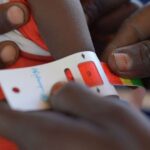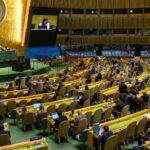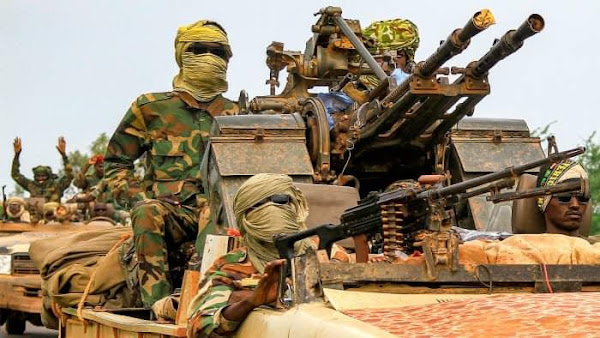The Sudan’s broad context of the civil war began in April 2023, primarily between the Sudanese Armed Forces (SAF) and the paramilitary Rapid Support Forces (RSF).
The conflict has had a heavy humanitarian toll, with tens of thousands killed, millions displaced internally, and many more refugees.
Though the situation is gained and becoming better day by day with returning to normal for many cities, including the capital city Khartoum but still some areas are in war chaos, city like Elfasher in Darfur.
There are so many issues and things behind this war. The involvement of Mercenaries from different countries, involvements of vehicles and weapons from different countries.
Sudan alleges that hundreds of mercenaries especially Colombians, plus from neighbouring African countries have been recruited, financed, or deployed by entities linked to the United Arab Emirates (UAE) to fight alongside the Rapid Support Forces (RSF).
I recently reported a group nicknamed the “Desert Wolves” former Colombian military personnel working under private security firms allegedly based in the UAE.
These mercenaries are alleged to have roles such as: operating drones, artillery, armored vehicles, participating in frontline combat, training, and being involved in violations of international law.
Sudan has formally submitted complaints to the United Nations Security Council accusing the United Arabs Emirates (UAE) of recruiting, financing, and deploying these mercenaries.
The Sudanese government accuses UAE of backing the RSF with weapons, equipment, logistics, flights, and funding.
Specific claims include that UAE-made armored vehicles like the Nimr Ajban APCs, fitted with French systems galix, have been used by the RSF. These may violate UN arms embargoes.
There is an alleged incident in Nyala, Darfur which I reported last month August 2025, where Sudan’s forces say they struck an Emirati aircraft carrying mercenaries and weapons destined for the RSF, killing at least 40 suspected Colombian fighters and UAE denies the claim. Sudan government cut diplomatic ties with the UAE over those accusations.
Regardless the reports and accusations about armored vehicles made in the UAE by UAE‑affiliated companies being used by the RSF. For example, UAE-made Nimr Ajban APCs with French Galix defense systems.
Another huge and hitting report is the Armoured vehicles from a Canadian-owned company have also been deployed in the arsenal of a Sudanese paramilitary force that stands accused of genocide, according to new photos and videos from the war-ravaged country.
The images show the armoured vehicles in war zones in Sudan, including the Darfur region, where they were carrying fighters of the Rapid Support Forces, a powerful militia that is widely reported to have committed massacres and other atrocities in Darfur and elsewhere in Sudan.
Independent arms experts have identified the vehicles as models manufactured by Streit Group, whose founder and chairman is Canadian businessman Guerman Goutorov. The company’s main factory is in the United Arab Emirates, the Middle Eastern country that is allegedly the biggest weapons supplier to the RSF.
Streit Group, founded in Canada in 1992, has described itself as one of the world’s biggest armoured-vehicle manufacturers, with thousands of employees and a capacity to produce 500 vehicles a month. But its activities in Africa have sparked controversy for years.
Over the past decade, The Globe and Mail has documented how Streit sold dozens of armoured vehicles to Libya, Sudan and South Sudan, despite international bans on arms sales to those countries.
In 2019, The Globe witnessed Streit’s armoured personnel carriers on the streets of Sudan’s capital, Khartoum, where they were supporting the military regime that had seized power in a coup.
The latest photos and videos, some of them posted on social media by RSF members themselves, show RSF troops using Spartan armoured vehicles – a model manufactured by Streit Group. The images are from North Darfur and West Kordofan, two regions of Sudan where the RSF has been waging a brutal offensive and killing civilians.
Two independent arms experts, who examined the photos and videos at the request of The Globe, said the vehicles were clearly identifiable as Spartans made by Streit.
“The number and shape of the windows on the side hull are a dead giveaway, alongside a number of other details on the vehicle,” said Kelsey Gallagher, a senior researcher at Project Ploughshares, a Canadian-based arms-control advocacy group. He also cited the “distinctive external profile” of the vehicles.
Another arms expert, who works for an international human-rights group, said he was certain that the vehicles in the photos and videos were Streit’s Spartan vehicles. The Globe is not naming him because he is not authorized to speak to the media on this issue.
The latest evidence of Streit vehicles is not the first in the Sudan war, a conflict that erupted in 2023 as a power struggle between the RSF and the Sudanese armed forces. Amnesty International, in a report last year, said Sudan’s military had released a video showing Streit Gladiator and Cougar armoured vehicles, which the army said it had seized from the RSF in North Darfur.
Human-rights activists have accused the RSF of genocide for more than a year, citing evidence that it killed thousands of civilians after capturing cities in Darfur. The U.S. government reached the same conclusion in January, issuing a formal declaration that the RSF and its allied militias have committed genocide.
“The RSF and allied militias have systematically murdered men and boys – even infants – on an ethnic basis, and deliberately targeted women and girls from certain ethnic groups for rape and other forms of brutal sexual violence,” then-U.S. secretary of state Antony Blinken said in a statement in January.
One of the social-media videos, released by RSF fighters earlier this month, shows that the RSF was using a Streit Spartan vehicle as part of its prolonged siege of the city of El Fasher, capital of North Darfur. The siege has caused famine and thousands of civilian deaths from starvation, artillery shelling and drone strikes.
“The illicit circulation of Streit-made vehicles in this conflict should come as no surprise,” said Mr. Gallagher, the Canadian arms researcher.
“Streit has previously violated UN arms embargoes, including those imposed on Sudan. It is almost certain that these arms transfers are originating from Streit’s facilities in the UAE, where the company faces considerably looser arms-control restrictions.”
It is unclear when the Streit vehicles arrived in Sudan, and whether they were shipped directly from the manufacturer or were first acquired by an intermediary. Under Canadian regulations, an export permit must specify the “end user” of a military product.
The Globe sent multiple e-mails to Streit officials to seek comment on the evidence of their vehicles in Sudan, but they did not respond. In the past, Streit has repeatedly denied that its exports have broken any laws or regulations. The UAE, for its part, has denied sending military supplies to the RSF.
Mr. Gallagher said the deployment of Streit vehicles in Sudan is an example of “the ongoing problem of jurisdiction shopping through offshore production, where arms manufacturers establish facilities abroad to evade government oversight over weapons exports.”
Streit Group established its main UAE factory in 2012, at a time when Canada did not require export permits for Canadian-owned companies that shipped their military-related products from foreign-based factories. But new federal rules introduced in 2019, after Canada joined the international Arms Trade Treaty, require Canadian citizens to obtain a brokering permit if they send military equipment from one country to another.
If Ottawa decides that the equipment sent by Canadian citizens could be used to violate international human-rights law, it can deny the export permit.
Nicholas Coghlan, a former head of Canada’s diplomatic mission in Sudan, told The Globe that Canada would have an obligation to prosecute the Canadian owner of Streit if the export of Streit vehicles to Sudan is confirmed, even if the vehicles were manufactured in the UAE.
Thida Ith, a spokesperson for Global Affairs Canada, said the department does not comment on specific transactions or export-permit applications because of commercial confidentiality.
But in response to queries from The Globe, she said Canada has not issued any brokering or export permits for military goods and technology to Sudan since the new brokering controls took effect in 2019.
Ms. Ith said Canada enforces the UN arms embargo on Sudan, which would prohibit the transfer or brokering of “arms and related material” to Sudan by any Canadian citizens or entities. She noted that Canada also has its own sanctions on Sudan, which target anyone involved in financing and weapons procurement for the war.
“Canada and its partners are increasingly seized with improving the effectiveness of our sanctions, including by working together to address sanctions circumvention,” she told The Globe.
“The unimpeded flow of arms into conflict zones undermines peace and fuels violence,” she said.
In the past, Streit has said that its sales do not violate Canadian or UN controls on military exports because its vehicles are not shipped with weapons attached.
The photos and videos from Sudan, however, show that machine guns have been attached to the turrets at the top of the Streit vehicles – a relatively simple procedure.
“The argument that these systems are not weapons simply does not hold water,” Mr. Gallagher said. “One only has to consider the circumstances of their use to see that they directly enable the ongoing conflict in Sudan.”
Streit Group, which recently hired the Hollywood actor Steven Seagal as its “brand ambassador,” has been the subject of several investigations in the past.
In 2015, the United States imposed a US$3.5-million penalty on two of Streit’s subsidiaries, along with a US$250,000 fine on Mr. Goutorov himself, for selling vehicles manufactured in the U.S. to Venezuela, Nigeria, Iraq and Afghanistan without export permits after retrofitting them with ballistic steel and bulletproof glass.
A year later, UN reports documented how Streit had sold dozens of armoured vehicles to Sudan, Libya and South Sudan despite international bans on arms sales to those countries. Some of the vehicles ended up in war zones, including Darfur and South Sudan. A report by a UN panel of experts in 2016 concluded that the export of Streit vehicles to Sudan was a violation of the UN arms embargo.
In 2020, The Globe documented how Streit vehicles with powerful water cannons had been deployed by riot police in Belarus to suppress prodemocracy protesters








